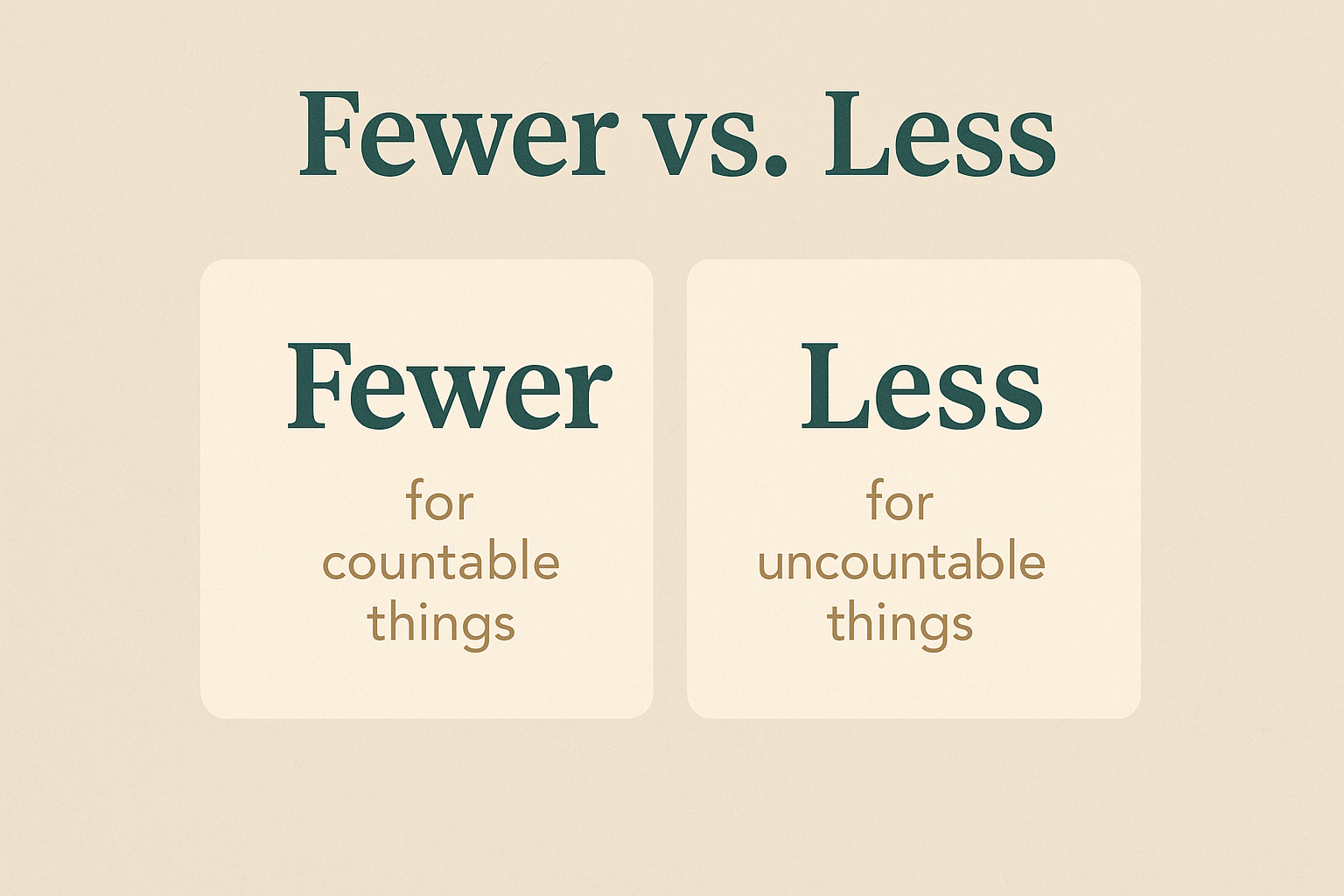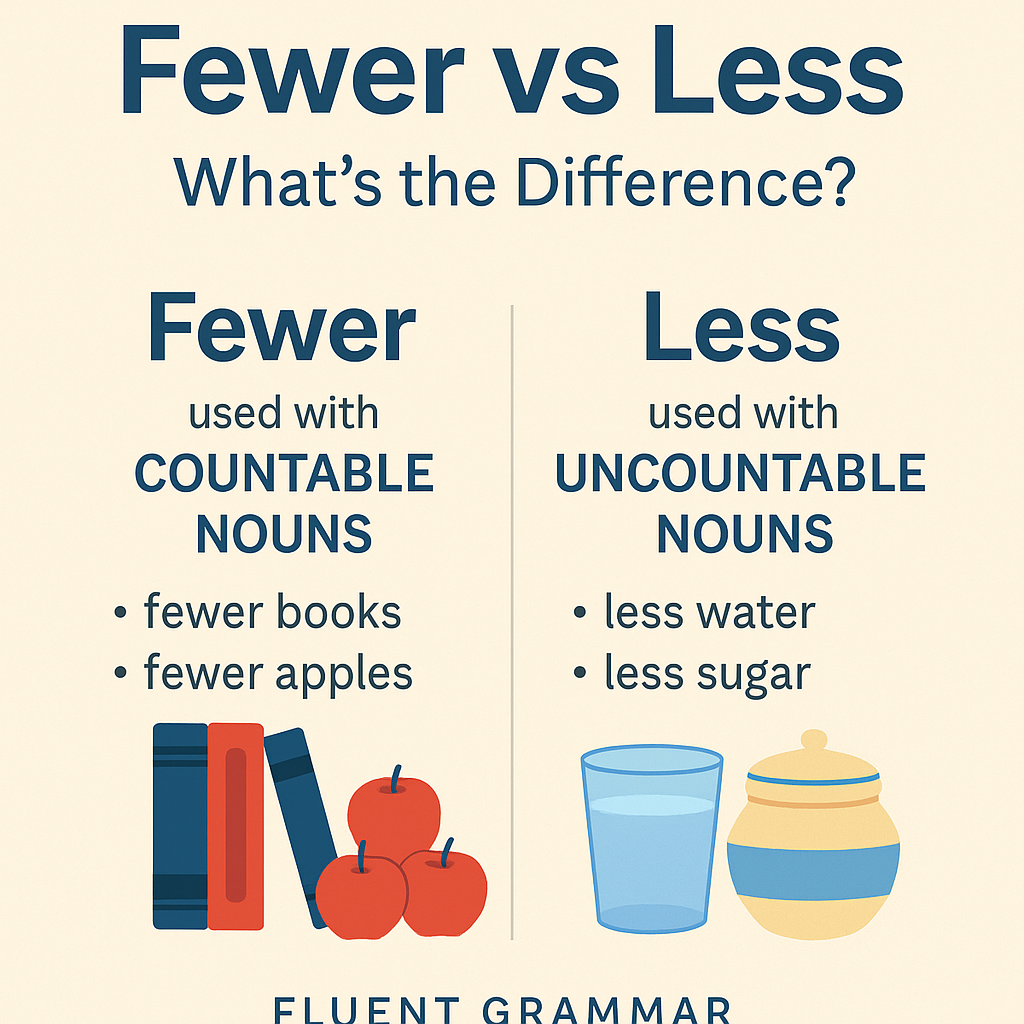Ever found yourself stuck between “fewer vs less” while writing or speaking? Don’t worry—you’re not alone. These two words might seem interchangeable, but they actually follow different grammar rules.
In this post, we’ll break down the difference between fewer and less in the simplest terms possible—plus give you tips and examples to get it right every time.
Table of Contents
The Basic Rule
“Fewer” is used with countable nouns, while “less” is used with uncountable ones. The Merriam-Webster Dictionary also clarifies this fact. Let’s look at this with examples:
- ✅ Correct: She has fewer books than her brother.
(Books are countable.) - ❌ Incorrect: She has less books than her brother.
- ✅ Correct: There’s less water in this glass.
(Water is uncountable.) - ❌ Incorrect: There’s fewer water in this glass.
What Are Countable and Uncountable Nouns?
Countable Nouns
These are things you can count one by one.
Examples: books, apples, coins, students
🟢 Use fewer:
- “I made fewer mistakes this time.”
- “There are fewer cars on the road today.”
Uncountable Nouns
These are things you can’t count individually because they’re usually a mass or abstract idea.
Examples: sugar, water, money, time
🟢 Use less:
- “There is less noise now.”
- “He has less patience than before.”
Common Exceptions
In casual speech or informal writing, people often use ‘less’ even when ‘fewer’ is technically correct. Here are some practical examples: –
🛒 Supermarket Signs
Ever seen a checkout sign that says “10 items or less”? Technically, it should be “10 items or fewer.” But because “less” sounds more natural in informal settings, it’s often accepted in spoken English and everyday writing.
🕗 Time, Distance, Money, and Weight
Even though these are technically measurable (and therefore countable), we often use less with them in informal usage:
- “It’s less than five miles to the station.”
- “She earns less than $1,000 a month.”
- “He lost less than two kilos last week.”
- “We have less than three hours left.”
➡️ In formal writing or academic English, it’s safer to stick with fewer if the unit is clearly countable.
Helpful Tip
If you can add an “s” to the noun (indicating it’s plural), chances are it’s countable and you should use fewer.
✅ “Fewer bottles” (✔️ bottles can be counted)
✅ “Less juice” (✖️ juice cannot be counted individually)

Examples in Sentences
| Fewer Examples | Less Examples |
|---|---|
| We need fewer chairs for this meeting. | We need less furniture for this room. |
| The new plan has fewer steps. | There’s less confusion this time. |
| I received fewer emails today. | He spent less energy on the task. |
Why This Matters
Using the correct word not only improves your grammar but also helps your writing sound more polished and professional. Whether you’re working on an essay, writing a blog, or just having a conversation, choosing between fewer and less correctly makes a big difference.
FAQs: Fewer vs Less
Can I use “less” instead of “fewer” in casual conversations?
Yes, in informal speech, many people use “less” for both countable and uncountable nouns. However, for writing or formal speaking, it’s best to stick to the rule.
Is it wrong to say “10 items or less”?
Technically, yes—it should be “10 items or fewer.” But it’s commonly accepted in casual contexts and seen on signs for brevity.
What about using “less” with time and money?
Though time and money are measurable, not countable, we usually use “less” with them. For example: “He spent less money,” or “It took less time.”
How do I remember when to use fewer vs less?
If you can count it (one apple, two apples), use “fewer.” If you can’t count it (milk, sugar, water), use “less.”

